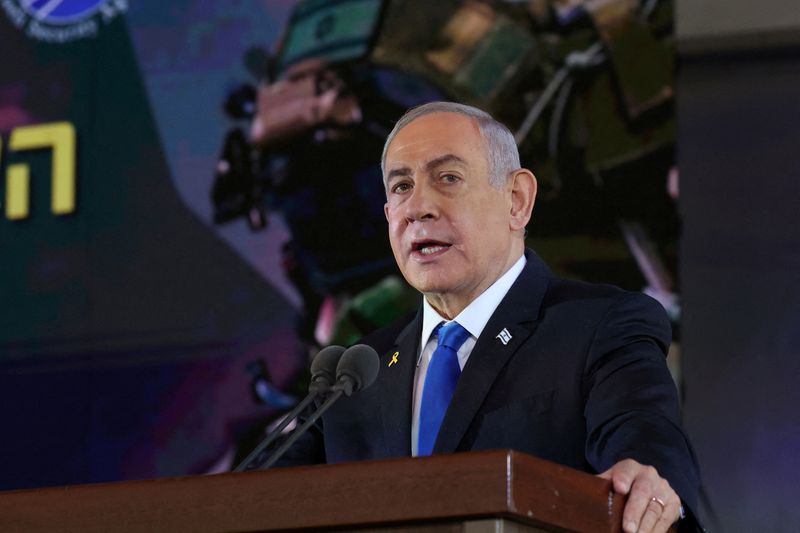By Ari Rabinovitch and Adam Makary
JERUSALEM/CAIRO (Reuters) – Israel’s airstrikes “hit hard” Iran’s defences and missile production, Prime Minister Benjamin Netanyahu said on Sunday, but Iranian Supreme Leader Ayatollah Ali Khamenei said the damage from Saturday’s attack should not be exaggerated.
With warfare raging in Gaza and Lebanon, direct confrontation between Israel and Iran risks spiralling into a regional conflagration. But a day after the airstrikes, there was no sign they would spark another round of escalation.
However, heavy fighting in Lebanon between Israeli forces and Iran-backed Hezbollah, which sharply intensified over recent weeks, continued on Sunday with an Israeli airstrike killing eight people in a residential block in Sidon, medics said.
“The air force attacked throughout Iran. We hit hard Iran’s defence capabilities and its ability to produce missiles that are aimed at us,” Netanyahu said in a speech, calling the attack “precise and powerful” and saying it met all its objectives.
The Islamic Republic has not signalled how it will respond to Saturday’s long-anticipated strikes, which involved scores of fighter jets bombing targets near the capital Tehran and in the western provinces of Ilam and Khuzestan.
The heavily armed arch-enemies have engaged in a cycle of retaliatory moves against each other for months, with Saturday’s strike coming after an Iranian missile barrage on Oct. 1, much of which Israel said was downed by its air defences.
Khamenei said Israel’s calculations “should be disrupted”. The attack on Iran, which killed four soldiers and caused some damage, “should neither be downplayed nor exaggerated”, he said.
The Iranian parliament speaker, Mohammad Baqer Qalibaf, said Iran was entitled to self-defence and its response “will be definite, in compliance with the requirements”.
U.S. President Joe Biden called for a halt to escalation that has raised fears of a wider Middle East war arising from the year-old Israeli-Hamas conflict in Gaza and Israel’s thrust into south Lebanon to stop Hezbollah rocketing northern Israel.
Separately, Israeli Defence Minister Yoav Gallant said Iran was no longer able to use its allies Hamas in Gaza and Hezbollah in Lebanon against Israel. The two groups “are no longer an effective tool” of Tehran, he said in a speech.
Gallant added that Hamas was no longer functioning as a military network in Gaza and that Hezbollah’s senior command and most of its missile capabilities had been eliminated.
Hamas has repeatedly said it is still able to function militarily, and Israel has recently conducted major new operations in devastated north Gaza against what it calls regrouping Hamas militants.
Hezbollah has said its command structure remains intact and that it retains significant missile capabilities.
LEBANON FIGHTING
On Sunday, the Israeli military urged residents of 14 villages in southern Lebanon to evacuate immediately and move north of the Awali river.
An Israeli strike on Sidon, a city in coastal south Lebanon, killed at least eight people and wounded 25 on Sunday, the country’s health ministry said.
Elsewhere in the south, a strike on Zawtar al-Sharkiya killed three people and a Saturday bombing of Marjayoun killed five, it said.
Israel said four of its soldiers were killed in south Lebanon fighting.

Hezbollah also said it had fired a large missile salvo at the Zevulon military industries facility north of Haifa in northern Israel. Hezbollah rockets hit a house and cars and rescue crews responded to put out the fire.
One woman was seriously injured, according to Israel’s ambulance service.